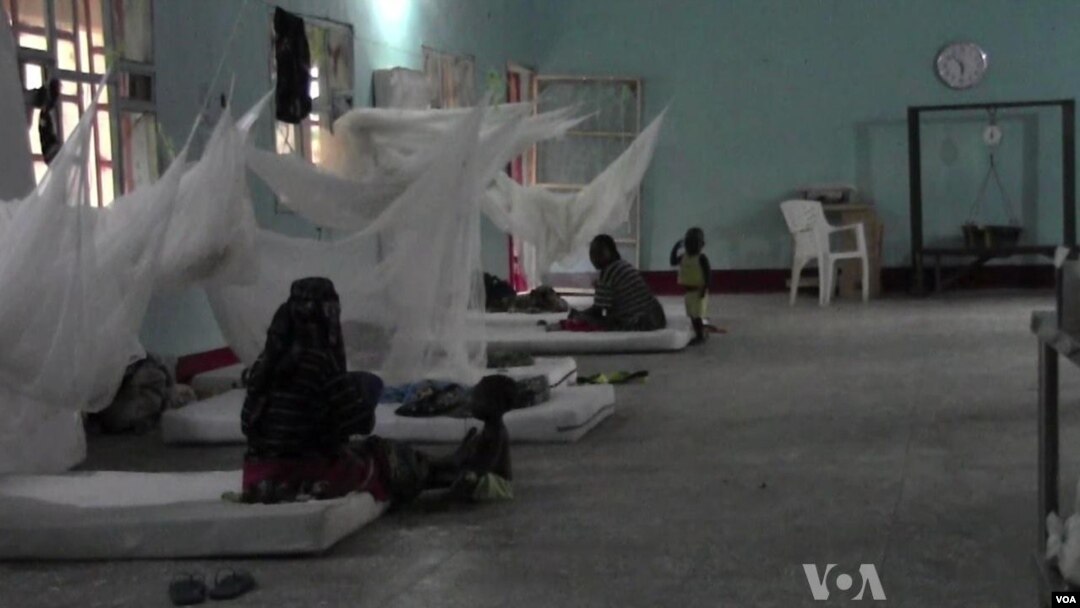ANKA, NIGERIA —
A large percentage of people killed by malaria each year are in Nigeria, and the disease is the country’s number one killer of small children. Health officials say modern life-saving drugs are available but the widespread use of out-dated drugs on a resistant strain of malaria continues to cost lives.
In this hospital in Nigeria's Zamfara State, these small patients have malaria. Mothers travel for hours to get to treatment for their children because there is no medicine in their villages.
"I brought the baby here because I noticed he had a high fever, and then he got diarrhea,” explains a mother.
Aid workers say the current surge in malaria began over the summer, and patients continue to pour in.
"At the end of July, my team called me and said, ‘Malaria exploded," says Chloe Wurr, a physician with Doctors Without Borders in the northern state of Sokoto. "We have so many children coming. Some of them arrived and we could barely keep them alive. They died before we could give them treatment."
Wurr says one out of every 10 children with severe malaria here dies, and that's with the best of care.
"Heath personnel are often very committed and want to help their community but they often don’t have the resources to treat people," she said. "If I do find any treatment present, it’s usually that that health worker has gone to a local pharmacy and purchased a drug and the drug they are most likely to purchase is chloroquine.”
The doctor says chloroquine can treat malaria in some countries. But in Nigeria, the disease has been resistant to the drug since the 1980s.
There are drugs that have been effective against malaria in Nigeria for the past decade and they are known as ACTs.
However Doctors Without Borders says the vast majority of clinics they have visited in the country don't have them, and the U.S. Centers for Disease Control says they are not available to most Nigerians.
The Nigerian government says it’s planning to increase ACT availability along with providing more bed-nets, which can keep the mosquitoes that transmit the disease from biting in the night.
But with the U.N. Children's Fund (UNICEF) saying that 250,000 Nigerian children under the age of five die every year from malaria, aid workers claim the program has a long way to go.
In this hospital in Nigeria's Zamfara State, these small patients have malaria. Mothers travel for hours to get to treatment for their children because there is no medicine in their villages.
"I brought the baby here because I noticed he had a high fever, and then he got diarrhea,” explains a mother.
Aid workers say the current surge in malaria began over the summer, and patients continue to pour in.
"At the end of July, my team called me and said, ‘Malaria exploded," says Chloe Wurr, a physician with Doctors Without Borders in the northern state of Sokoto. "We have so many children coming. Some of them arrived and we could barely keep them alive. They died before we could give them treatment."
Wurr says one out of every 10 children with severe malaria here dies, and that's with the best of care.
"Heath personnel are often very committed and want to help their community but they often don’t have the resources to treat people," she said. "If I do find any treatment present, it’s usually that that health worker has gone to a local pharmacy and purchased a drug and the drug they are most likely to purchase is chloroquine.”
The doctor says chloroquine can treat malaria in some countries. But in Nigeria, the disease has been resistant to the drug since the 1980s.
There are drugs that have been effective against malaria in Nigeria for the past decade and they are known as ACTs.
However Doctors Without Borders says the vast majority of clinics they have visited in the country don't have them, and the U.S. Centers for Disease Control says they are not available to most Nigerians.
The Nigerian government says it’s planning to increase ACT availability along with providing more bed-nets, which can keep the mosquitoes that transmit the disease from biting in the night.
But with the U.N. Children's Fund (UNICEF) saying that 250,000 Nigerian children under the age of five die every year from malaria, aid workers claim the program has a long way to go.




